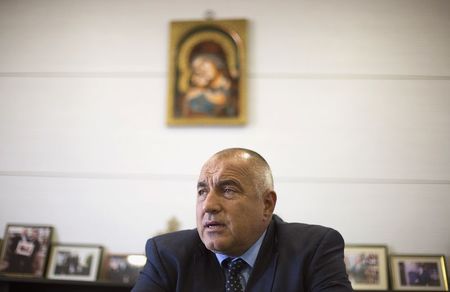By Tsvetelia Tsolova
SOFIA (Reuters) - The frontrunner in Bulgaria's October election said on Thursday he was ready to hold talks with other parties after the vote, including to discuss forming a grand coalition to ensure political stability.
Boiko Borisov, the leader of the centre-right GERB party, is tipped to win the Oct. 5 poll, but may fall short of a majority, which risks dragging the Balkan state into more political turmoil and hurting its growth prospects.
In the wake of the country's worst financial crisis since the 1990s, Borisov also said Bulgaria's Central Bank Governor Ivan Iskrov should resign the day after the election for his handling of troubled lender Corporate Commercial Bank.
Bulgaria is gearing up for its third election in two years, after the Socialist-led government, whose one year in office was overshadowed by massive anti-graft protests, floods and a banking crisis, resigned in July.
The country is currently run by a caretaker administration, and Borisov warned Bulgarians may have to go to the polls again at the start of 2015 if no party managed to form a government.
Bulgaria is the European Union's poorest state and whoever wins in October faces a raft of challenges, including reviving a sluggish economy, cleaning up corruption, plugging a gaping deficit in the energy sector and unfreezing blocked EU funds.
"A minority government, when stability is needed, is risky for the country," Borisov told Reuters in an interview.
"I hope that we can close the issue with the elections on Oct.5. We should lock ourselves inside parliament until we can come up with a decision. People deserve it ... even if the parties' reputations are hurt," he said.
"We are already talking about a salvation government. If the country cannot be saved now, from January onwards after new elections there will be nothing left to save".
Political analysts say a GERB coalition with the right-wing Reformist Bloc of smaller parties in the 240-seat parliament is more likely than a grand coalition with GERB's main opponents, the Socialists. But they also said Borisov's statement to Reuters was a way of keeping his options open.
"If GERB gets more seats, like 110 or more, then maybe it will be a centre-right coalition. But if it gets less than 100, then a grand coalition comes into play," said Kantcho Stoichev, an analyst with pollster Gallup International.
Borisov favours forming a centre-right coalition. But he also expressed concerns that talks with the right-wing group of parties might prove difficult given their list of demands, including that he should not be the next prime minister.
Also leaving the door open for a grand coalition, the head of the Socialist party told Reuters earlier this week that he was prepared to talk with other groups.
BANK RESCUE
Borisov said it was too early to decide whether Bulgaria should rescue Corpbank, the country's fourth-largest lender, which has remained shut following a bank run in June, or to push it into insolvency.
An audit into Corpbank's books is ongoing and should be ready by Oct 20. Angry depositors now protest weekly in the Bulgarian capital Sofia and elsewhere, demanding that the government and central bank reopen Corpbank.
But efforts to devise a rescue plan have stalled partly because of the elections and the central bank has said it will keep control over Corpbank until mid November.
"Months have passed and we still don't know how many bad loans there are, can this bank actually be rescued?" said Borisov, a former prime minister.
The Corpbank crisis has shaken public confidence in Bulgaria's banking system and raised concerns about how well the country's lenders are supervised. Borisov said GERB will push ahead with plans made under the last Socialist government for Bulgaria to join Europe's Banking Union.
Borisov's previous administration was forced to resign after protests over high utility costs in early 2013, in a country where power bills gobble up large parts of monthly incomes.
Nevertheless Borisov, a former bodyguard and karate expert, will propose legal changes to safeguard the independence of the energy regulator. That would ensure that prices would not be kept artificially low because of political pressure.

Instead, GERB plans to offer energy aid to the poorest and overhaul ageing communist-era apartment blocks, home to some 700,000 households, to cut energy consumption.
(Editing by Matthias Williams and Crispian Balmer)
